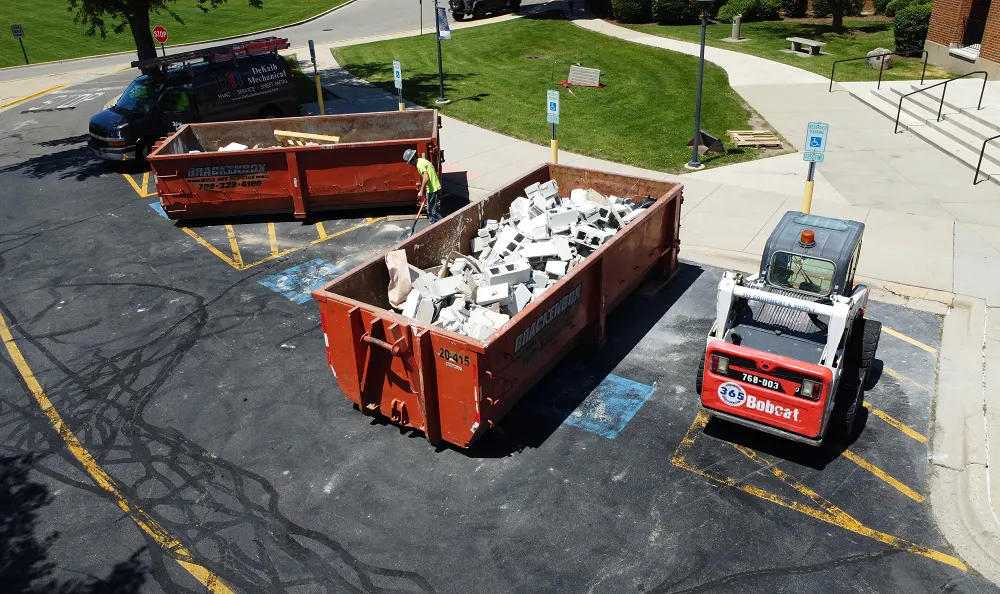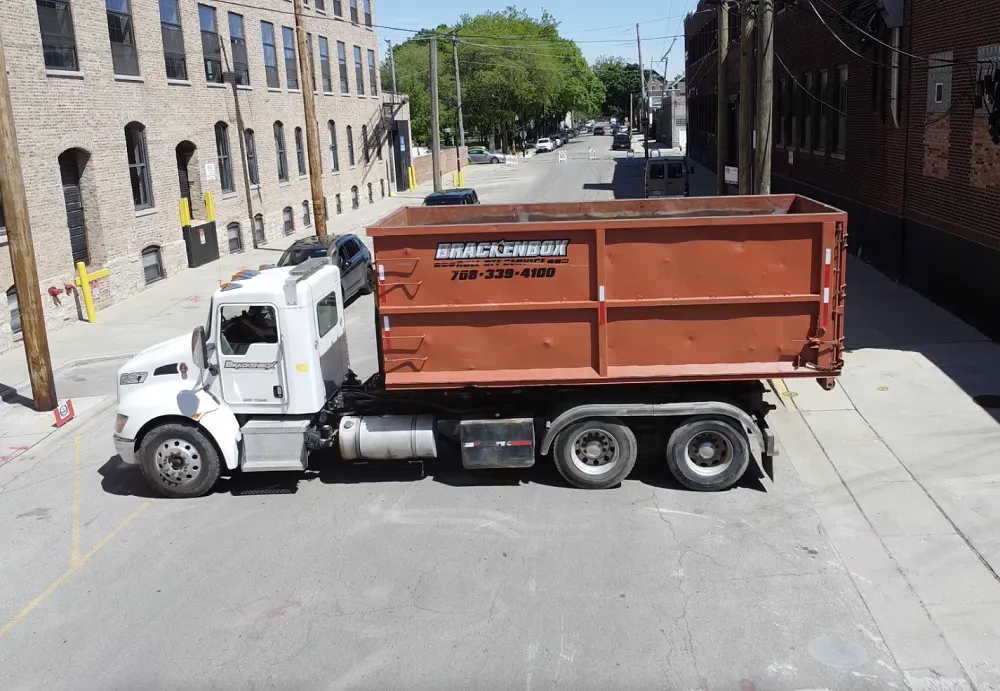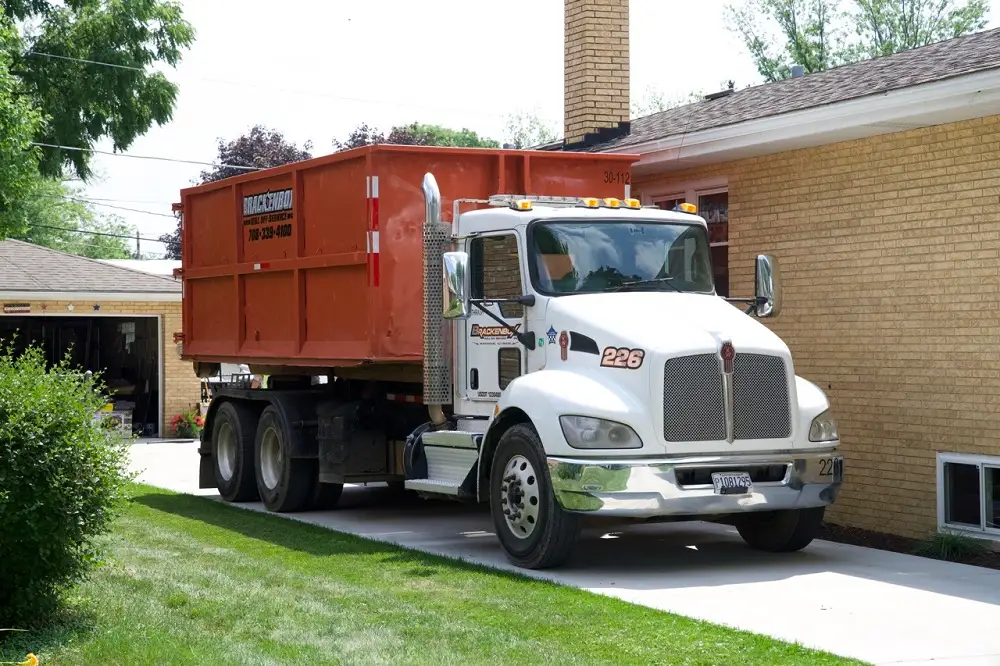What Is Commercial Debris?
Commercial debris includes all the solid waste materials generated by businesses during their operations. This is different from residential waste, which has different regulations and disposal methods. How much waste a business generates depends on its nature.
A waste audit can help assess the volume and types of debris your business produces. This allows you to better understand your business needs when selecting a waste collection service.
Types of Commercial Debris

Commercial waste can vary and require various disposal methods to reduce environmental harm. Common categories include:
General Waste
This includes everyday items such as paper, cardboard, plastic, and packaging materials. A significant amount of general waste consists of paper and cardboard. Much of this waste material is recyclable, and effective commercial recycling programs are key for waste reduction. To minimize environmental harm, use recycling bins and participate in recycling programs.
Solid Waste
This encompasses non-hazardous solid materials like construction debris. Construction debris frequently comprises a large portion of commercial waste. This includes things such as wood, concrete, drywall, and metal components. Demolition waste also falls under this category.
Hazardous Waste
This includes materials posing risks to human health or the environment. Hazardous waste includes things such as chemicals, solvents, batteries, and certain types of medical waste. Hazardous materials and hazardous wastes often require special handling and disposal methods by local and state regulations.
Electronic Waste (E-Waste)
This category includes computers, TVs, phones, and other electronic devices. E-waste contains hazardous components that require special handling. In many cases, e-waste needs to be recycled through specialized recycling centers.
Recyclable Materials
This includes materials that can be processed and reused, such as paper, cardboard, plastics, metals, and glass. Commercial recycling programs can help businesses significantly reduce environmental harm. For example, sorting recyclable materials and utilizing efficient recycling services can help you save money and reduce your impact on landfills.
Non-Recyclable Materials
This consists of materials that cannot be easily recycled. These non-recyclable materials often end up in landfills. To minimize this type of waste, careful planning and waste reduction efforts are helpful.
Why Proper Commercial Debris Disposal Matters
You might be wondering about the importance of this process. In reality, effective commercial waste disposal matters for several reasons:
- Legal compliance: Businesses are legally obligated to dispose of their debris according to local and national regulations. Failure to comply can result in significant fines and penalties.
- Environmental protection: Improper disposal practices contribute to environmental harm, including soil and water contamination and increased landfills. Handling waste materials properly is crucial for minimizing environmental impact. Using effective methods to reduce environmental harm and participating in recycling programs help promote environmental sustainability.
- Brand reputation: Businesses with a strong commitment to responsible debris disposal enhance their brand image and attract environmentally conscious customers.
- Employee safety: Improper handling of hazardous waste can expose employees to serious health risks. Keep your workforce safe by following best practices for debris disposal.
- Cost savings: Efficient debris disposal and waste reduction strategies can save money on disposal fees. Properly segregating recyclable materials helps reduce the overall amount of waste sent to landfills.
Our Tips for Proper Commercial Debris Disposal

Effective disposal of commercial waste involves a multi-pronged approach:
- Conduct a waste audit: Assess the types and quantities of waste that your business generates to identify opportunities for waste reduction and recycling.
- Implement a recycling program: Establish clear procedures and provide the necessary recycling bins to encourage the separation and recycling of recyclable materials. Partner with a local recycling center or recycling services provider.
- Segregate hazardous materials: Identify and properly store hazardous wastes and hazardous materials separately, following all local regulations and safety guidelines. These often require special handling.
- Choose appropriate disposal methods: Select suitable disposal methods to reduce environmental harm. This may involve partnering with a waste collection service for regular pickups or renting containers for larger projects.
- Monitor and improve: Regularly review your commercial waste disposal processes to identify areas for improvement and ensure continuous compliance. Your waste disposal procedures should meet the needs of your business.
By implementing these strategies, businesses can effectively manage their debris disposal, minimize environmental harm, and ensure compliance with regulations.
Why Choose Dumpster Rental Services for Commercial Needs?
Renting a dumpster is often the most efficient and cost-effective solution for your commercial debris disposal needs. Here's why:
- Convenience and efficiency: Dumpster rental significantly simplifies debris disposal. A dedicated container on-site allows for convenient and ongoing disposal throughout your project to keep your work area clean and organized. This eliminates the need for frequent trips to a landfill or transfer station, saving valuable time and resources.
- Cost-effectiveness: While there's an initial cost, renting a dumpster is often more economical than repeatedly hiring a junk removal service or using your own vehicles for disposal. The upfront rental cost is typically less expensive than managing disposal through alternative means.
- Compliance and safety: Reputable dumpster rental companies ensure responsible debris disposal, adhering to all local and national regulations. This minimizes legal risks and enhances workplace safety. Using a professional service minimizes the risk of accidents and ensures compliance with all regulations.
- Streamlined project management: A dedicated dumpster on-site streamlines project management, which means debris can’t disrupt workflows or delay your project. This eliminates the need to constantly interrupt the workflow to manage disposal, maximizing efficiency.
- Acceptable materials: Reputable providers clearly outline acceptable materials. This transparency avoids unexpected charges associated with improperly disposed materials. To avoid additional fees associated with improper waste removal, you’ll need to understand the acceptable materials.
- Scalability: Dumpster rental services offer various sizes, accommodating projects of all scales — from industrial waste to large-scale demolitions.
While several waste disposal options are available for businesses, renting a dumpster offers a winning combination of convenience, efficiency, cost-effectiveness, safety, and compliance. Partnering with a reputable provider like Brackenbox gives you peace of mind that your commercial debris disposal needs are handled smoothly and professionally.
Brackenbox: Your Partner in Commercial Debris Disposal
If you dispose of commercial waste responsibly, you help to protect the environment and minimize your business's impact. Efficient methods like dumpster rental significantly impact efficiency and cost and matter for legal compliance.
Brackenbox is proud to offer reliable and efficient commercial waste removal services, providing various dumpster sizes to meet your business needs. We have over two decades of experience, and we handle all types of non-hazardous debris, from general waste to construction debris, offering transparent pricing and timely service. Contact us today to discuss your commercial waste collection needs and experience the Brackenbox difference!
FAQ
Reduce Your Business’s Environmental Impact!
Brackenbox provides responsible commercial waste removal services using efficient disposal methods and promoting recycling to minimize your environmental footprint.
Rent a Dumpster Now
You Need?





